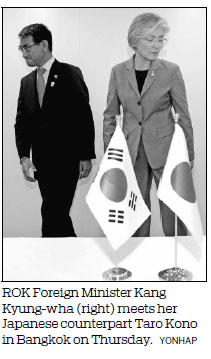Seoul warns Tokyo to drop 'white list' trade threat
SEOUL - The Republic of Korea warned Japan on Thursday that it would be forced to review security cooperation between the two key US allies in Northeast Asia if Tokyo pushes ahead with plans to remove Seoul from its "white list" of trusted trade partners.
The squabble between the neighbors follows a decades-long quarrel over Japanese forced labor of Koreans during World War II.
Japan last month unveiled tough restrictions on exports of chemicals vital to Seoul's world-leading chip and smartphone industry.
Tokyo has also said it will remove Seoul from its preferential trade status as early as Friday, a move that could affect hundreds of key items imported to the ROK and punch a hole in its economy.
ROK Foreign Minister Kang Kyung-wha met her Japanese counterpart Taro Kono on Thursday on the sidelines of a regional foreign ministers' meeting in Bangkok and urged Tokyo to walk back the move.

"I made clear the grave consequences it would have on our bilateral relations if the measure was imposed," she told reporters.
Kang warned that the renewal of a military intelligence-sharing agreement between the countries could be jeopardized by any "white list" removal.
"I said that the security cooperation framework between South Korea and Japan may be affected," she added.
Meanwhile, a 72-year-old ROK man was in critical condition after setting himself ablaze in downtown Seoul on Thursday, apparently to express his anger toward Japan over trade and wartime history, a police official said.
An official from Seoul's Jongno Police Station said the man was being treated at a hospital for burns over his entire body. Police at the scene found a bag that likely belonged to the man and contained a memo and leaflet criticizing Japan over its decision to tighten controls on high-tech exports to the ROK and vowing to fight Tokyo until Japanese Prime Minister Shinzo Abe apologizes.
Also inside the bag was a book about the late Kim Bok-dong, who was one of the first victims to speak out and break decades of silence over the Japanese military's sexual slavery during World War II, according to the police official, who didn't want to be named, citing office rules.
The incident came weeks after a 78-year-old ROK man died after self-immolating near the Japanese embassy in Seoul. Police last month said the man had phoned an acquaintance earlier to say he planned to set himself on fire to express his antipathy toward Japan.
The dispute between the two neighbors erupted last month when Tokyo tightened controls on the exports of photo-resists and two other chemicals to ROK companies that use them to produce semiconductors and display screens for smartphones and TVs.
The ROK's removal from the Japanese preferential trade list could have a broader impact as it would require Japanese companies to apply for case-by-case approvals for exports to the ROK of hundreds of items deemed sensitive-not just the three materials affected by the trade curbs that took effect on July 4. It would also allow Japanese authorities to restrict any export to the ROK when they believe there are security concerns.
The ROK's presidential office said President Moon Jae-in discussed issues surrounding the Japanese export controls with Cabinet ministers for more than two hours on Thursday, but didn't immediately reveal what was said.
The Japanese trade measures have stoked public anger in the ROK, where many believe Japan still hasn't fully atoned for atrocities committed during its colonial occupation of the Korean Peninsula from 1910 to 1945. An increasing number of ROK citizens have been boycotting Japanese consumer goods and travels to Japan.
Agencies
(China Daily 08/02/2019 page11)














